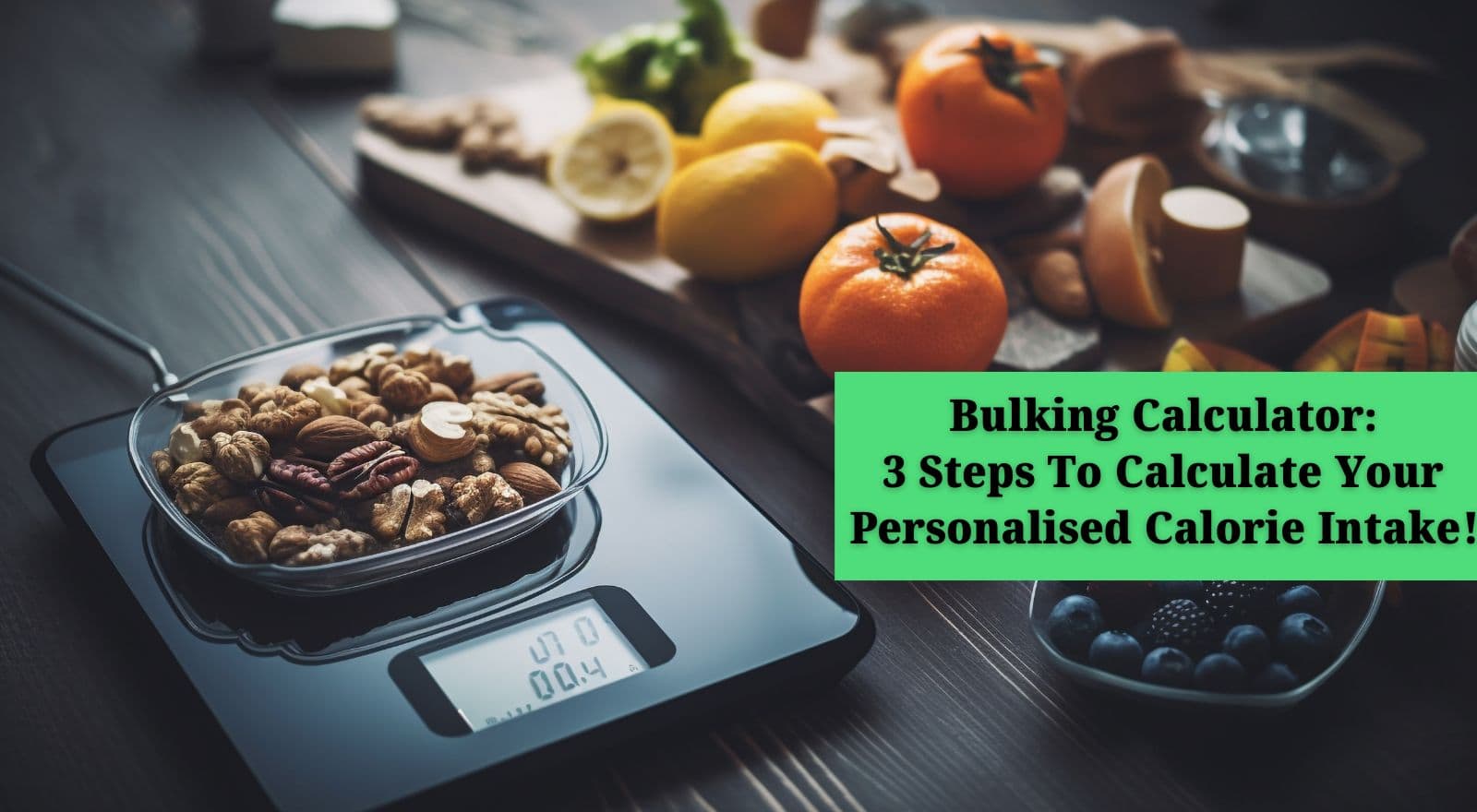Are you struggling to gain muscle despite eating more food? Do you feel unsure about how many calories you actually need for effective bulking? Many people make the mistake of eating too little, which slows down muscle growth, or consuming too many calories, giving unwanted fat gain.
To build lean muscle efficiently, you need a precise calorie intake that matches your body type, activity level, and fitness goals. This is where the calories for bulking calculator comes in handy. The calories for bulking calculator analyses your basal metabolic rate (BMR), activity level, and surplus calories needed for muscle growth. It takes the guesswork out of your diet by giving you the exact calories to consume daily to bulk up without excessive fat gain.
Whether you’re a beginner or an experienced lifter, understanding your calorie needs is the ultimate first step toward successful bulking. But how do you accurately determine your ideal calorie intake for muscle growth? Let’s break it down step by step to calculate your personalised intake for maximum muscle growth!
Table Of Contents
1. How Do I Calculate Calories For Bulking? 3 Steps Calculator
2. How Many Calories Should I Eat For Bulking?
3. Is 2500 Calories Enough For Bulking?
4. Expert’s Advice
5. The Final Say
6. FAQs
7. References
How Do I Calculate Calories For Bulking? 3 Steps To Calculate
Getting your calorie intake right is the most important thing for bulking. Too little, and you won't grow; too much, and you'll gain unnecessary fat. You'll need to consistently eat the right amount of calories and protein for weeks and months, combined with the best workout routine for bulking. While various formulas exist, the Harris-Benedict equation (revised by Roza and Shizgal in 1984) is a reliable starting point. It helps you calculate your personalised calorie needs, which depend on your sex, weight, height, and age.
Try this simple 3-step approach to calculating your bulking calories so you can start your muscle-building journey on the right foot.
1. Calculate Your Basal Metabolic Rate (BMR)
Your BMR is the number of calories portions your body burns at rest just to keep you alive. Your body's baseline energy needs are fulfilled through foods that increase BMR. Consider these formulas for this first step of calories for bulking calculator:
- Men: Present BMR = 88.362 + (13.397 x total weight in kg) + (4.799 x exact height in cm) - (5.677 x present age in years)
- Women: Present BMR = 447.593 + (9.247 x total weight in kg) + (3.098 x exact height in cm) - (4.330 x present age in years)
Let's take an XYZ example: A 21-year-old man, 5'8" (173 cm) tall, weighing 140 pounds (63.5 kg):
- BMR = 88.362 + (13.397 x 63.5) + (4.799 x 173) - (5.677 x 21) = approximately 1896 calories.
2. Calculate Your Total Daily Energy Expenditure (TDEE)
Know that your TDEE calculator includes your BMR plus the calories you burn through daily activities and exercise. Estimate your activity level in this second step of calories for bulking calculator:
- Level 1 (Sedentary): Little to no exercise (TDEE = BMR x 1.2)
- Level 2 (Lightly Active): Light exercise 1-3 days/week (TDEE = BMR x 1.375)
- Level 3 (Moderately Active): Moderate exercise 3-5 days/week (TDEE = BMR x 1.55)
- Level 4 (Very Active): Hard exercise 6-7 days/week (TDEE = BMR x 1.725)
- Level 5 (Extra Active): Very hard exercise/training daily (TDEE = BMR x 1.9)
Our example XYZ man, who works out 3 days a week, is moderately active (Level 3):
- TDEE = 1896 x 1.55 = approximately 2938 calories.
Also Read: 7 Benefits Of TDEE Calculator To Track Total Daily Energy Expenditure & Formulas To Use It!
3. Calculate Your Bulking Calories
To bulk up, you need a calorie surplus; for this, you must have the best foods for bulking. A good starting point is 15% above your TDEE. Consider this in this calories for bulking calculator:
Bulking Calories = TDEE x 1.15
For our XYZ example, man:
- Bulking Calories = 2938 x 1.15 = approximately 3379 calories.
- So, this man should aim for around 3379 calories per day to bulk up.
Note: Remember, this is a starting point. Pay attention to your body's response and adjust as needed. And don't just focus on hitting the calorie number; prioritise healthy foods and adequate protein intake for optimal muscle growth!
Also Read: How to Calculate Calorie Intake for Weight Loss
How Many Calories Should I Eat For Bulking?
So, you're ready to bulk up and pack on some muscle! It's not as simple as just eating everything in sight, though. The key to bulking is a calorie surplus – meaning you eat more calories daily than your body burns. And while protein is super important for muscle growth, you need a good mix of carbs and fats, not just protein alone.
Now, you don't want to gain weight too quickly or end up with more fat than muscle. A healthy goal is to gain about 1 to 2 pounds a week. See, for every pound of muscle, you need roughly 2,000 to 2,500 extra calories. But for every pound of fat, it takes around 3,500 extra calories. So, you want to aim for that sweet spot. Try to find it out this way:
1. Figure Out Your Maintenance Calories
This is how many calories you need to eat just to stay the same weight you are now. One way to do this is to track what you eat for a few weeks and see if your weight stays steady to keep your body weight index healthy. Try to get about 40% of your calories from carbs, 40% from protein, plus 20% from fat.
2. Use An Online Calorie Calculator
You plug in your details, and it estimates your maintenance calories. ToneOp Fit app, for example, can give you all the necessary details. Once you know that number, you can add those extra calories for muscle growth. Remember, it's a bit of a balancing act. You need enough extra calories to build muscle, but not so many that you gain a lot of fat. So, adjust as needed, and be patient! Building muscle is a long-run marathon, not a sprint.
Also Read: Overweight Vs Obese: Which Is Worse? Discover Risk Factors, BMI And More!
Is 2500 Calories Enough For Bulking?
Well, it's not a simple yes or no answer. It depends on how active you are, your current size, and how intense your workouts are. Let's dive into how to figure out the right number for you:
Key Areas | Details |
Starting Point | If you are currently consuming fewer than 2500 calories, increasing to 2500 may initiate bulking. |
Individual Needs | 2500 calories is sufficient for some but insufficient for others. Activity level, body size, and training intensity influence calorie requirements. More active people with larger body frames require more. |
Significant Muscle Gain | For substantial muscle growth, exceeding 2500 calories is often necessary. A calorie surplus above maintenance levels is generally required for effective muscle building. |
"Cutting" Diet | 2500 calories can be used in a "cutting" diet to lose body fat while simultaneously building muscle (though this is more challenging and often less efficient than the dedicated cutting vs bulking phase). |
Trial Period | If unsure, try 2500 calories for 14 days, monitoring weight and weekly gains to gauge effectiveness. |
Macronutrient Balance | Achieving the 2500-calorie intake requires carefully balancing carbohydrates, proteins, and fats. |
Macronutrient Examples | Training Days: 20% Carbs, 50% Protein, 30% Fat Non-Training Days: 40% Carbs, 30% Protein, 30% Fat. These are adjusted based on your preferences. Consulting is always recommended for personalised dietary plans.) |
Importance of Protein | Protein is prioritised on training days to support muscle repair and growth stimulated by exercise. |
Importance of Carbohydrates | Carbohydrates are prioritised on training days to provide energy for productive training sessions that facilitate muscle growth. |
Expert’s Advice
I recommend a gradual, healthy calorie increase. Focus on nutrient-rich foods like lean proteins, complex carbs, and healthy fats. This promotes muscle growth over fat gain. Understanding your body's response is key. Monitor your progress, plus adjust your diet as needed. If you're not gaining weight, eat slightly more. Too much fat gain? Tweak your macros or calories. Regular adjustments ensure healthy muscle growth.
Health Expert
Lavina Chauhan
The Final Say
Ultimately, using the calories for bulking calculator is a fantastic tool to guide your bulking journey for a personalised starting point for your calorie intake, taking the guesswork out of the equation. Meanwhile, observe, are you gaining weight steadily? Do you feel energised during your workouts? Are you recovering well? If not, don't be afraid to adjust your calorie intake slightly. With attention to your body's signals, you'll be well on your way to attaining your healthy bulking goals.
FAQs
1. What are the benefits of a bodybuilding calorie calculator?
A bodybuilding calorie calculator helps you determine the right calories to eat to support your muscle-building goals. It considers your present age, gender, weight, height, and activity level to give you a personalised calorie target.
2. What is the right calorie intake for bulking?
A good starting point for bulking is consuming around 22 calories per pound of body weight daily. Like, if you weigh 150 pounds, aim for about 3300 calories daily.
3. How many calories are needed for muscle building?
To build muscle, you generally need to consume more calories than you burn, creating a caloric surplus. A surplus of 250 to 500 calories above your Total Daily Energy Expenditure (TDEE) is typically recommended. This provides the extra energy needed for workouts, recovery, and muscle growth. The exact amount varies based on individual factors like age, weight, activity level, and metabolism.
References
- https://www.bulknutrients.com.au/blog/muscle-building/how-to-determine-calories-for-a-lean-bulk?srsltid=AfmBOorBzzOQGhkk0cbefISornUP0cyBMQZpRLbRflupCTZkdBQZU7_Y
- https://www.livestrong.com/article/546009-how-to-calculate-bulking-calories/
- https://www.roborfitness.com/blogs/nutrition/how-many-calories-do-i-need-when-bulking#calculator
- https://calculator.academy/bulking-calculator/
- https://www.trifectanutrition.com/blog/how-many-calories-should-i-eat-to-gain-weight?srsltid=AfmBOooBcwYARL_2rJZM-GGYftBZlTEOmsVAT970JiW61XBgHOyBhZad
- https://30dayfitness.app/food/what-does-a-2500-calorie-diet-look-like/
- https://www.maxinutrition.com/blogs/sports/calories-to-bulk#:~:text=Men:%20BMR*%20=%2088.362%20%25,individual%20to%20maintain%20current%20weight.
About ToneOp Fit
ToneOp Fit is a platform dedicated to improving and maintaining good health through a comprehensive range of goal-oriented health plans with up to 3 Coach support. With a range of Weight Management, Medical Condition, Detox Plans, and Face Yoga Plans, the app also provides premium health trackers, recipes and health content. Get customised diet, fitness, naturopathy & yoga plans and transform yourself with ToneOp.










































